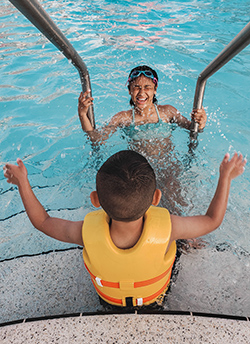 ‘It’s like a heat waaa-ve’
‘It’s like a heat waaa-ve’
No, seriously it’s super-hot. I don’t know where you are but here in Houston it’s 96 degrees! Swimming is one of our favorite things to do as a family and its sweet relief in this heat. It’s also a wonderful way to keep everyone active and healthy. As an acute care pediatrician, I’m always eager to share the do’s and don’ts of summer water safety.
Sadly, approximately 800 children die each year in the United States from drowning incidents. The good news is these accidents are preventable. Here’s what you need to know.
- Establish pool rules early and clearly, before you get near the water.
Children get so excited poolside! Make sure everyone understands the consequences for rule-breaking and stand firm. Everyone who visits my home must recite the rules before they jump in, from kindergartners to college students.
- Identify who is on Pool Patrol.
This person should be able to swim, provide basic first aid, and be free of distractions and/or adult beverages while providing supervision. They should be committed to staying within arms reach of children the entire time they are in the water. Short breaks to the bathroom or answer the phone provide more than enough time for an accident to happen. It is not safe to just remain within earshot; most accidents happen without much noise at all.
- Maintain safety at the poolside.
Every year I treat children who slip and fall before reaching the water. Some of these injuries can be serious and are usually the result of running or horse-playing that went unsupervised.
- Make sure beginners wear a life vest.
Children who cannot yet swim should wear a well-fitting life vest every time they go in the water. Floaties are unreliable and can easily be removed.
- Flotation devices.
Use extreme caution when placing small children in ‘leg in’ floating devices. Children are top heavy and can easily fall into the water headfirst with their legs caught in the device. Be sure to stay in the pool within arms reach of children using these devices.
- Swimming lessons.
The ability to swim does not guarantee protection from drowning, especially in children younger than 5. Accidents still happen. The same safety recommendations apply.
- Germs are water resistant.
Much media attention has been given to germs in pools this summer. The truth is wherever people gather in groups, germs will gather also. This is why pools are chlorinated and tested regularly. Make sure you’re swimming in a pool you trust, practice routine hand hygiene, and wash swim clothes frequently.
- Protect their ears.
Swimmers ear is common during the warmer months. It usually happens when small amounts of water are left behind, giving bacteria the perfect opportunity to infect the ear canal. Do your best to dry little ears after swimming. A hair dryer set on low and passed by the ears for less than 30 seconds does the trick for my family.
- Diving
No one should dive in water less than 8 feet deep. We travel often and our kids know if we can still see Daddy’s head when he stands in the deep end of a pool we are unfamiliar with, no diving allowed. If you’re unsure, just don’t do it.
I love my profession. Families trust pediatricians even if they just met. I’ve been asked all sorts of “since you’re here” questions in the line at my local grocery store or at my daughter’s piano recital. Here are 3 common questions I get about swimming with answers, since I’m here.
:::::
When should my child start swimming lessons?
It’s okay to teach babies to enjoy water play however, this is for recreational purposes only. A toddler may very well be able to move through the water and enjoy, but they aren’t able to coordinate holding their breath and are at extremely high risk for injury if left unsupervised. It’s best to begin formal swim lessons when your child is at least 4 or 5 years old.
How long should we wait after eating to return to the water?
The concern with any level of exercise immediately after eating is vomiting and/or cramping that could lead to injury. I recommend lighter foods and snacks at the poolside and at least 30 minutes before returning to the water.
If my child has an ear infection, should they avoid swimming and if so for how long?
Internal and external ear infections make the skin in our ears, and the ear drums very fragile. Water and pressure changes can make already infected ears worse. Waiting until they are finished treatment is best before returning to the pool.
I often say that becoming a Mom changed my perspective as a pediatrician but, being a pediatrician doesn’t make me a better parent than anyone else. I worry and wonder just like other Moms. The good news is pediatricians are experts at re-assuring parents and answering questions. We are here to help you and your family have the safest, happiest summer yet. Something else you want to know? Ask us, doctors’ orders!
Happy Summer!
Dr. Honeymom
***
Dr. Avian Tisdale
Avian “Dr. Honeymom” Tisdale has been an acute care pediatrician for over a decade and is board certified by the American Board of Pediatrics. She is also an accomplished healthcare executive and professional speaker. When not answering the call of doctor, wife, and Mom she enjoys spending time in her garden and travelling the world.
References
Unintential Drowning Get the Facts-Home and Recreational Safety
Swim Lessons: When to Start and What Parents Should Know
How to Choose and Use Sunscreen
